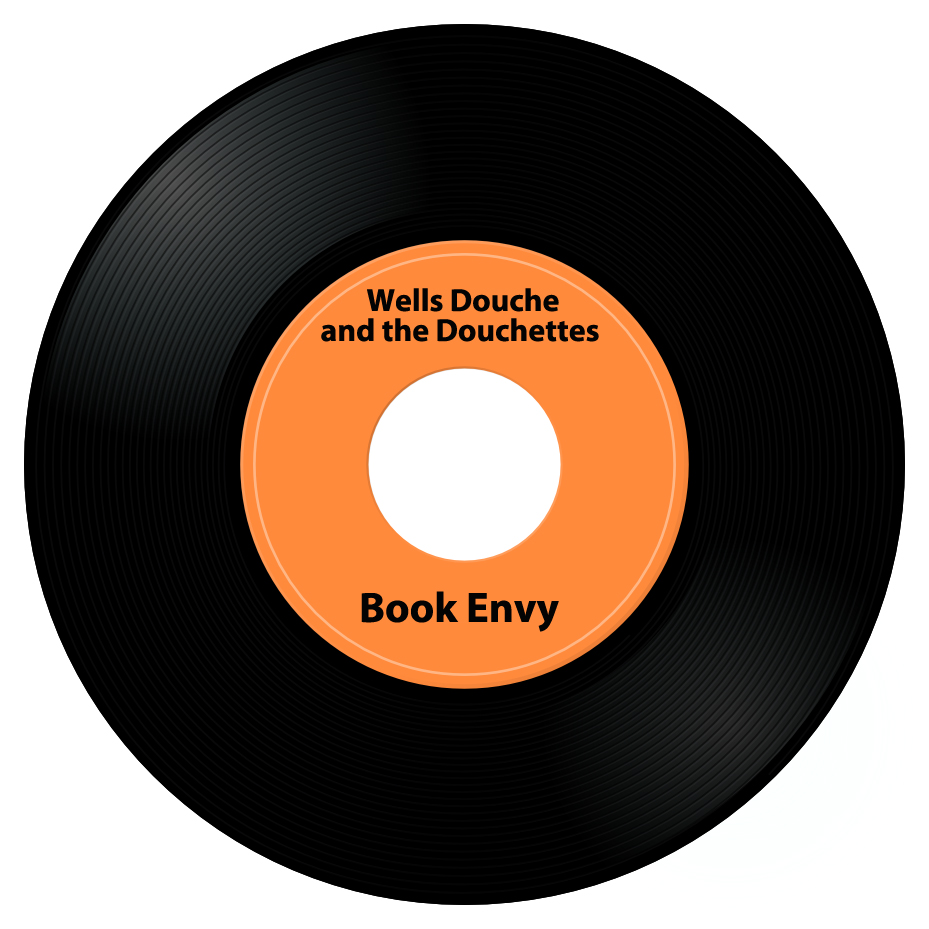 I was never that big a believer in the “One Hit Wonder” as a necessarily deliberate act to sabotage another author’s work. I’m not saying it doesn’t happen. If there’s anything in this world that you think never happens (aside from Republicans voting for Obama on anything), I’d at least suggest you take another look or allow for the possibility. I just never was that bothered by it. I admitted in one blog to getting caught up in the campaign against One Hit Wonders once. ONCE. Someone who slammed me in the comments in my blog, implying I thought I was better than [him], marched straight over to my book and gave it a horrible review. Lied about it, actually. Worse, he used the exact language (word for word) that I did in my blog, but against me. For those who haven’t heard the story, I immediately asked a bunch of writer friends to mark the review as “not helpful”. I regretted it almost immediately but not before a dozen or so had clicked the link and the “no” button.
I was never that big a believer in the “One Hit Wonder” as a necessarily deliberate act to sabotage another author’s work. I’m not saying it doesn’t happen. If there’s anything in this world that you think never happens (aside from Republicans voting for Obama on anything), I’d at least suggest you take another look or allow for the possibility. I just never was that bothered by it. I admitted in one blog to getting caught up in the campaign against One Hit Wonders once. ONCE. Someone who slammed me in the comments in my blog, implying I thought I was better than [him], marched straight over to my book and gave it a horrible review. Lied about it, actually. Worse, he used the exact language (word for word) that I did in my blog, but against me. For those who haven’t heard the story, I immediately asked a bunch of writer friends to mark the review as “not helpful”. I regretted it almost immediately but not before a dozen or so had clicked the link and the “no” button.
Never again have I done anything remotely close to that. Frankly, one jerk who hates you (or let’s say 2% of the reviewers who hate you) aren’t going to change the direction of your fate. I am a firm believer, and always will be, that in the long run, quality stays, crap fades away. You might get away with selling snake oil to the first crowd you run into but in a year every town you hit will be trying to string you up by your bootstraps. Quality writing is what you need, not a bunch of glowing reviews. People hardly believe in the rating/reviewing system anymore anyway.
 That being said, I had a friend post in Facebook today that he’d gotten a One Hit Wonder (never liked the term, either, for the record—like a Near Miss; isn’t that a Near Hit?). One Hit Wonder has a whole different connotation: a compliment and eulogy all rolled into one. What we’re really talking about in this context is a Scud Attack. Remember when every few hours Saddam was launching one of those Washington’s Monument-sized, inaccurate pieces of junk through the black desert sky? I’d rather call these equally-misguided kinds of reviews One Launch Scud’s. Well my friend got one, and he was steamed, and he wanted to know what to do about it. I’m intentionally not naming him or his Scud-lover. But I told him don’t do anything (best policy) and then I went to read it, because I wanted to know if it was really a Scud or just some collateral spittle. (Not everyone loves everything and besides, I’ve known too many “whistle-blowers” claiming they received a poor review and when I went and read it I thought “nope, that pretty well sums up your crappy book”).
That being said, I had a friend post in Facebook today that he’d gotten a One Hit Wonder (never liked the term, either, for the record—like a Near Miss; isn’t that a Near Hit?). One Hit Wonder has a whole different connotation: a compliment and eulogy all rolled into one. What we’re really talking about in this context is a Scud Attack. Remember when every few hours Saddam was launching one of those Washington’s Monument-sized, inaccurate pieces of junk through the black desert sky? I’d rather call these equally-misguided kinds of reviews One Launch Scud’s. Well my friend got one, and he was steamed, and he wanted to know what to do about it. I’m intentionally not naming him or his Scud-lover. But I told him don’t do anything (best policy) and then I went to read it, because I wanted to know if it was really a Scud or just some collateral spittle. (Not everyone loves everything and besides, I’ve known too many “whistle-blowers” claiming they received a poor review and when I went and read it I thought “nope, that pretty well sums up your crappy book”).
In this case, knowing beforehand it was literally a One-Star review, I knew it was at the very least way, way too harsh because this guy’s book is about as close to One-Star (especially in today’s crapucopia) as the Earth is to the Sun. Even if you followed Amazon’s now completely bullet-riddled guidepost, you couldn’t get close to One-Star on this book.
 Then I read the review. Wow. This was an honest-to-Republican-Guard Scud launched by a for-sure A-hole. He actually called the book the worst piece of fiction he’d ever read. EVER. Dude doesn’t get out much. I could go out right now and find ten books with three cliches in the first three paragraphs and the only time it would take me would be lining up the books. Nah, there’s so much worse fiction out there (I mean WAY worse) you could build a bridge from Sarah Palin’s rear deck to Russia. And back again.
Then I read the review. Wow. This was an honest-to-Republican-Guard Scud launched by a for-sure A-hole. He actually called the book the worst piece of fiction he’d ever read. EVER. Dude doesn’t get out much. I could go out right now and find ten books with three cliches in the first three paragraphs and the only time it would take me would be lining up the books. Nah, there’s so much worse fiction out there (I mean WAY worse) you could build a bridge from Sarah Palin’s rear deck to Russia. And back again.
And what you don’t know is this guy’s another writer. And was my friend’s “friend”. He tweeted for the guy. Got a Merry Christmas email from him. And for the record, my friend’s book has 52 Five-Star reviews out of 70.
This review was personal. And then the douche didn’t use his real name but copied and pasted under his Goodreads account the same review and rating (and was logged in, so his real last name came up). I said I wasn’t going to use names, but here is the title of the review:
“Solid fare for illiterate, Daily Mail-reading little Englanders”
Ahem. Please. Kiss your mother with that spiteful little mouth? Funny thing is, I went and read a sample of this douchebag’s single book. It was not bad writing at all—I mean the sample I saw was honestly pretty f*cking good! I’m not saying it was Pulitzer material but I would have kept reading.
And that’s how you play the game of life and reviews, dear friends, writers, and countrymen. Just be honest. There are too many people in this world who, if they had something (anything) against you personally, you could never get them to be honest about your book.
Oh I wanted the guy’s book to stink. But it didn’t. At least not the portion I read. So I’m not going to come on here (or worse, go to his page and write a Scud Review and launch it at him). What have we come to? This guy is ANOTHER WRITER for God’s sake. Using what is supposed to be a public, respectable forum to hurt another writer for what look to me as clearly personal reasons? (And before you make a comment about my latest choice of book covers above, you should know that I honest feel that way; for all I know I would LOVE AH as a person, but as an author? My Australian Shepherds write better—and I’m not building myself up on her; I am being 100% truthful. Okay, the Aussie comment was overboard, but come on, she could buy and sell me a thousand times over!)
The thing is, I felt bad for my friend. Not only because his book is really solid and a hell of a good read, but because I know how much that shit hurts. And so does Mr. Douchebag. He did it to hurt my buddy. Again, I won’t use his name. It’s not my place. But if you want to go match his review on Amazon and Goodreads and come to your own conclusions, you are free to do so sirs and madames.
So let’s review, writers:
Don’t try and build up your own book, self-esteem, ranking, or success by purposely attacking another member of your craft.
(It is, however, okay to feel a little glib and snicker quietly when you see the other guy’s book isn’t selling at all. As long as you’re honest about it.)
~~~~~~~~~~~~~~~~~~~~~~~~~~~~~~~~~~
The blank page is dead…long live the blank page.
~~~~~~~~~~~~~~~~~~~~~~~~~~~~~~~~~~
 Author known to use spontaneous satire, sarcasm, and unannounced injections of pith or witticisms which may not be suitable for humorless or otherwise jest-challenged individuals. (Witticisms not guaranteed to be witty, funny, comical, hilarious, clever, scintillating, whimsical, wise, endearing, keen, savvy, sagacious, penetrating, fanciful, or otherwise enjoyable. The Surgeon General has determined through laboratory testing that sarcasm can be dangerous, even in small amounts, and should not be ingested by those who are serious, somber, pensive, weighty, funereal, unsmiling, poker-faced, sober, or pregnant.)
Author known to use spontaneous satire, sarcasm, and unannounced injections of pith or witticisms which may not be suitable for humorless or otherwise jest-challenged individuals. (Witticisms not guaranteed to be witty, funny, comical, hilarious, clever, scintillating, whimsical, wise, endearing, keen, savvy, sagacious, penetrating, fanciful, or otherwise enjoyable. The Surgeon General has determined through laboratory testing that sarcasm can be dangerous, even in small amounts, and should not be ingested by those who are serious, somber, pensive, weighty, funereal, unsmiling, poker-faced, sober, or pregnant.)




What a beef-witted magpie.
Writers who use reviews to hurt other writers remind me of the man who gets in his new Cadillac and rams into your Cadillac because he doesn’t want you to have a brand new car. In the process, he winds up hurting himself even worse. I hope this guy’s head went through the windshield.
Rob, And I think it is really even worse than you make it out. What little I understand about the Amazon algorithms indicates that when Amazon’s computers are deciding which books to promote, they take one-star reviews into account. So, this reviewer didn’t just dis his “friend’s” book, he hurt the book on Amazon’s marketing program. It’s a vicious world out there in the writing business, and reviewers need to consider what they are doing. Their actions have consequences beyond the mere expression of their opinions about a book.
right on rob, thanks for that tidbit, it hits everybody, life is too short to get bog down in the scuds that inevitably come along
There are so few published writers out there that this tactic hurts everyone, not just the two authors. We should be banding together and building each other up, not trying to tear each other down.
It’s sad that it has come to this. I think as soon as you start to have a modicum of success you attract the (very well named) scuds. But as you say, I think the whole ‘review’ thing has become very suspect – both ways; gushing superlatives balanced by underhand scud missiles. I guess we just have to shrug and rise above it.
Stll, it’s low and despicable.
I am a firm believer in the old saying, “if you can’t say something nice, don’t say anything at all.” If I leave a review on Amazon or wherever, I really mean every word of it.
As authors, we all belong to the same club. One for all and all for one, as long as that one is not REALLY bad. In which case, not saying anything says enough.
I get a lot of this kind of thing because of my essays on political matters and the self-publishing scam. Angry folk trace my essays back to my novels and short stories and unload their poison.
It’s part of being a writer. There are always going to be those kinds of folk out there. Develop a thick skin and move on.
As for the “star” system at Amazon, those don’t account for much. Most of the five-star reviews were either produced by shills or the author’s friends and relatives; and the one-star reviews are mainly written by people who hate the author for his (often imagined) political and philosophical views. It’s a bad system all around.
Yes there are reviews written by the author or his friends. Yes there are one star reviews written by someone with an axe to grind. There’s usually a good way to tell both – it’s often the only review the ‘writer’ has posted. There are also thousands of reviews, both for and against, written in a few lines, which have little meaning. ‘I loved/hated this book’ stuff.
What I look for is a review where the reviewer explains why they loved or hated the book. These are the reviews with real meaning. Take for example that famous book ’50 shades of Grey’ It has about 4,000 5 star reviews, about the same number of 1 star reviews and about a thousand each of all the other ratings. What’s interesting are the huge number of meaningless reviews in the 5 star category and extended reviews in the one/two star category which explain why they didn’t like the book. 50 Shades is a best seller with an overall rating of 3.2 stars. It is clearly not a ‘good’ book but it is certainly a successful book.
Still getting caught up on your blogs, Rob, so I just got around to reading this one.
I agree that giving one-star reviews out of some sense of spite or simply because the reviewer might have gotten poor service at his breakfast counter that morning is an unfair and hurtful practice.
But I think the inverse does even more damage.
If fellow writers are encouraged to “build each other up,” as Mr. Foster says above, four- and five-star reviews are given out like Halloween candy to books that just don’t deserve it.
This causes two kinds of damage: One, the writer who receives tons of undeserved five-star reviews from other writers and non-objective readers is led to believe that his or her work is good enough to deserve the top rating. That false value on the writer’s work may lead to a complacency, a failure to grow because he or she believes the writing has achieved a level of proficiency that, in reality, it has not. You rake in a bunch of five-star reviews (in exchange for a similar reward from you) from your internet community, and it stunts you as a writer.
Two, this process renders the reviewing system meaningless. I’m skeptical of reviews anyway, but when they’re disingenuous and downright dishonest, I as a reader feel cheated.
Of the two kinds of damage done by these overly generous reviews, the former is much more harmful than the latter.
All of us would benefit from blunt, honest criticism that pulls no punches and pushes us to put out our absolute best effort.